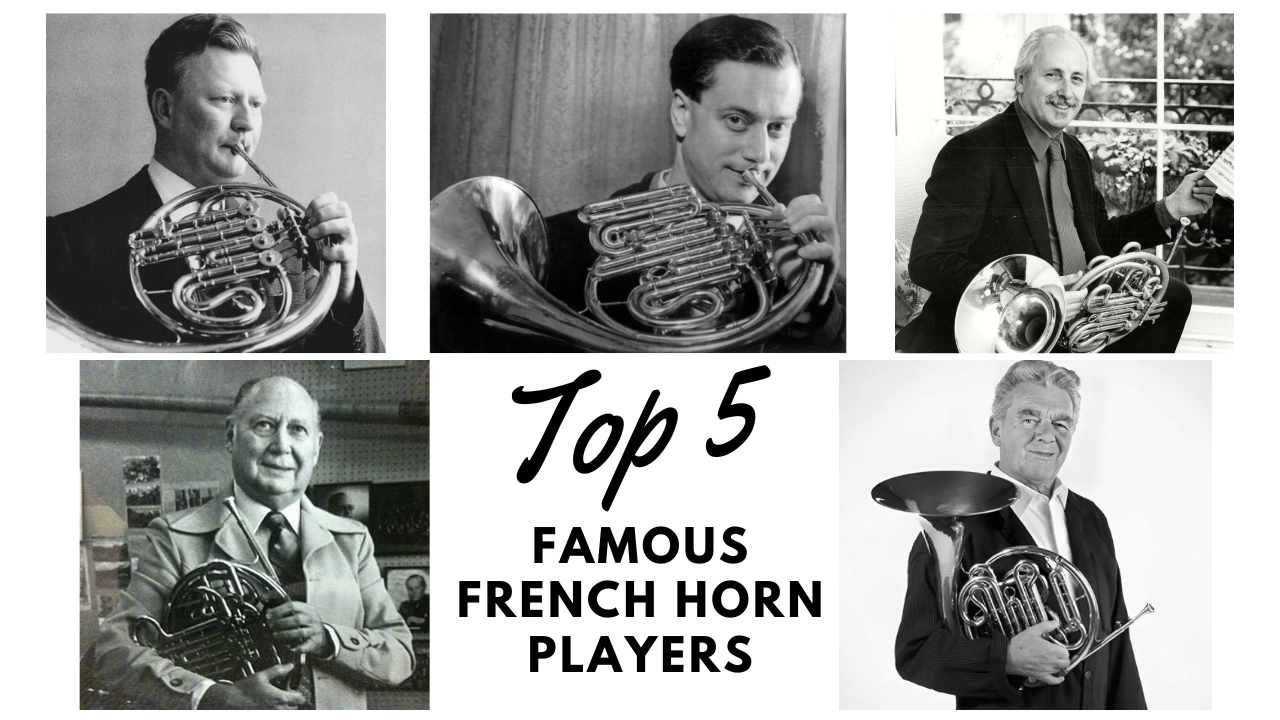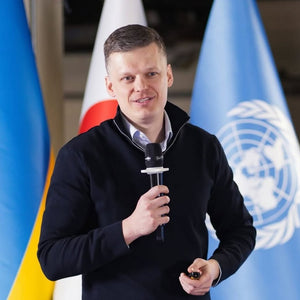The French horn is an amazing instrument that really stands out when it plays alongside other orchestral instruments due to its mellow and broad voice. The history knows the names of many French horn players who left a great imprint on the use and perception of this instrument. In this article, we want to share with you brief information about the top 5 famous French horn players of all time.
1. Dennis Brain
The British musician Dennis Brain is one of the greatest horn players of the 20th century, who popularized the French horn as a solo instrument and expanded its repertoire in chamber music. He was only 17 years old when he had the first professional concert in the Queen's Hall with the Busch Chamber Players where he played the second horn to his father.

At the age of 24, he was already the most in-demand horn player in England. He collaborated with Benjamin Britten, Humphrey Searle, Malcolm Arnold, and Mátyás Seiber. Dennis Brain played with the Philharmonic and the Royal Philharmonic orchestras alongside with Terence MacDonagh, Jack Brymer, Gwydion Brooke, and Gerald Jackson.
Dennis Brain was very devoted to his Raoux piston-valve horn, resembling his father’s horn, and only in 1951 he switched to an Alexander single B♭ horn with a custom narrow lead pipe.
2. Philip Farkas
Philip Farkas was the principal French horn player in the Chicago Symphony Orchestra. His musical journey began from taking lessons from his neighbor who was a trumpet player. Playing a brass instrument was not only the way to refine his skills but also a treatment method against asthma.

Farkas performed with Chicago Symphony and Cleveland orchestras. He was also a music professor in several educational establishments, including Indiana University, Cleveland Institute, Kansas City Conservatory, Northwestern University, Roosevelt University and others. He shared his knowledge with soloists worldwide by conducting clinics and workshops.
Farkas was also known as the founder of the Wind Music Inc. publishing company. He collaborated with Renold Schilke and consulted Yamaha. Philip Farkas was also one of the creators of Holton-Farkas product line, which featured French horns and mouthpieces. Alongside Holton, he created 18 different models of French horns and 6 mouthpieces.
3. Hermann Baumann
Having started a musical career as a singer and jazz drummer, German musician from Hamburg Hermann Baumann switched to the French horn when he was 17. He learned to play this instrument under the guidance of Fritz Huth. His talents were recognized when he became the winner of the ARD International Music Competition in 1964 in Munich.

Hermann played with the prestigious Dortmund Orchestra and the Stuttgart Radio Symphony Orchestra, spent time in tours, engaged in collaborations as soloist and recorded both on modern and natural horns.
He shared his experience with students during all his three decades teaching at the Folkwang University of the Arts in Essen. He encouraged younger musicians to find their own style rather than mimicking his style. Hermann conducted master classes in different countries of the world, successfully combining the role of an educator and performer. Even after retirement, he continued to take part in symposiums.
4. Barry Tuckwell
The musician from Australia, Barry Tuckwell started to play the French horn when he was 13. It wasn’t his first instrument as he already played piano, violin, and organ by that time. As the musician admitted in his interviews, the instrument had chosen him, not vice versa.

Two years later, after he discovered a horn for himself, he already played with the Melbourne Symphony Orchestra and a year later with the Sydney Symphony Orchestra. Since 1955, he played as the first horn in the London Symphony Orchestra where he stayed for the next 13 years, holding the position in the board of directors and later becoming the chairman of the board.
After he left the orchestra he focused on his career as the soloist and conductor, and this differed him from others since not so many musicians did so, especially virtuosos. Barry Tuckwell entered history as one of the most recorded French horn soloists, who released more than 50 records. He was also an owner of three Grammy Awards. Barry has written three books devoted to horn and aspects of playing this instrument.
5. Alan Civil
A British horn player, Alan Civil studied the instrument under the guidance of Aubrey Brain, the father of Dennis Brain. His first career milestone was playing the second horn to his teacher, Dennis Brain, in the Royal Philharmonic Orchestra. After Brain left the orchestra to join Philharmonia, Alan got the leading position of the section. Later he also became a member of Philharmonia, where he held the position of the principal horn player.

Alan Civil is known for being the first person of non-German descent who was a member of the Berlin Philharmonic Orchestra. He stayed with them for a long time, and in 1966, he joined the BBC Symphony Orchestra where he was appointed a principal horn and stayed there until his retirement.
The most notable works of Alan as a soloist included horn concertos of Mozart, recording of Benjamin Britten's “Serenade for Tenor”, as well as recording of “Horn and Strings” with Robert Tear.
Apart from his success in classical music field, Alan recorded the horn solo for the famous The Beatles' song "For No One". His name was included in credits on the band’s record.
Final Word
We hope you enjoyed our brief review of five well-known horn players. We are already working on other articles devoted to brass musicians, so stay tuned.
At our website, you can find other articles about French horn: care tips, French horn in various music styles, the history of the French horn.
Check out our accessories for single and double French horns, made of genuine leather and available in multiple colors to customize the appearance of your instrument and protect it from external impacts.




 https://kgumusic.com/pages/about-us
https://kgumusic.com/pages/about-us
2 comments
P. S (Addendum to message I wrote yesterday.) Both Valkenier and Meek played on single b flat instruments. It. must be noted that these instruments do not have a robust sound.
I studied 3 years with Harold Meek of BSO. He and Wiliem Valkenier, the principal horn, played 1st and 3rd through most of the 1940’s. (Meek also played principal horn for Pops during this time.) Thier sound was different from the big double horn sound of New York, and the balanced brass sound of Chicago. The Boston sound emanated from some important factors, two of which were the leadership of Walkenier and the sound of Symphony Hall which played best to an A of 444.
Walkenier got his early ,trainging in Europe before coming to the US. This training was first on the hand horn which would be basically a controlled, small sound.
Meek picked-up this interest in the hand horn to the point of recording a record of excerpts. ( He expressed his true feelings one day in a lesson when he said to me, “Thank God for the invention of the valve.”)
Valkenier also spread his influence through many of his students whom I am told he taught with great patience.
Anyway, these are some of the factors that have led to the unique bright sound of the BSO horns to the present.
Before closing, I would like to point-out an example of Meek’s masterful playing of the 3rd horn in the Munch recording of Berlioz’s ’Royal Hunt and Storm Music" available on the internet. (Unfortunately there is a missed note due to dental problems of old age.)
My Best,
Tom Giblin